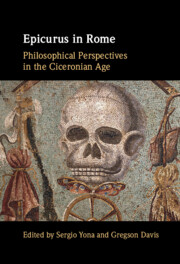Elizabeth Asmis is Professor of Classics at the University of Chicago. She is the author of Epicurus’ Scientific Method (1983) and articles on Plato, Philodemus, Lucretius, Seneca, Epictetus, Marcus Aurelius and others. Her current research focuses on Epicureanism and Stoicism, Cicero’s political philosophy and ancient aesthetics, and her teaching covers Greek and Roman philosophy, rhetoric and medicine.
Monica R. Gale is Professor in Classics at Trinity College, Dublin. She is the author of Myth and Poetry in Lucretius (1994), Virgil on the Nature of Things: The Georgics, Lucretius and the Didactic Tradition (2000) and other books and articles on Lucretius and on Late Republican and Augustan Poetry. She is currently working on a commentary on the complete poems of Catullus for the Cambridge Greek and Latin Classics series.
T. H. M. Gellar-Goad is Associate Professor of Classics and Zachary T. Smith Fellow at Wake Forest University. He specializes in Latin poetry, especially the funny stuff: Roman comedy, Roman erotic elegy, Roman satire and – if you believe him – the allegedly philosophical poet Lucretius. He is the author of Laughing Atoms, Laughing Matter: Lucretius’ De Rerum Natura and Satire (2020) and Plautus: Curculio (2021).
Nathan Gilbert is Assistant Professor at Durham University. He completed his PhD in 2015 at the University of Toronto and has published articles and given conference papers on Cicero, his Epicurean contemporaries and intellectual culture in the late Republic. He is currently working on a new edition of the fragments of Metrodorus of Lampsacus.
Pamela Gordon is Professor of Classics at the University of Kansas. She is the author of The Invention and Gendering of Epicurus (2012), the essay “Epistolary Epicureans” in Epistolary Narratives, edited by Owen Hodkinson and Patricia Rosenmeyer (2013) and the introduction to The Complete Works of Sappho, translated by Stanley Lombardo (2016). Her research interests beyond Epicureanism include gender studies, Greek vase-painting and Greek and Roman poetry.
Daniel P. Hanchey is Associate Professor of Classics at Baylor University. His research interests lie chiefly with the dialogues of Cicero, both their form and content. He has published several articles on these topics and is currently at work on a monograph entitled Building Friendship: De Amicitia and the Architecture of Cicero’s Dialogues, which synthesizes many of these ideas.
Mathias Hanses is Assistant Professor of Classics and Ancient Mediterranean Studies at Penn State University. His research interests lie primarily in Roman drama, the history of ideas and Black classicism. He is the author of The Life of Comedy after the Death of Plautus and Terence (2020), which examines Roman comedy and its influence from the stage onto the pages of Latin literature from Cicero to Juvenal.
Geert Roskam is Professor of Greek Studies at the Catholic University of Leuven. He is the author of many articles and edited volumes on ancient philosophy and of On the Path to Virtue: The Stoic Doctrine of Moral Progress and its Reception in (Middle-)Platonism (2005), Live Unnoticed: On the Vicissitudes of an Epicurean Doctrine (2007), A Commentary on Plutarch’s De latenter vivendo (2007) and Plutarch’s Maxime cum principibus philosopho esse disserendum. An Interpretation with Commentary (2009).
Katharina Volk is Professor of Classics at Columbia University and has published widely on Roman poetry and philosophy. Her books include The Poetics of Latin Didactic: Lucretius, Vergil, Ovid, Manilius (2002), Manilius and his Intellectual Background (2009) and Ovid (2010); she is the co-editor with Gareth Williams of Roman Reflections: Studies in Latin Philosophy (2016). Her latest monograph is The Roman Republic of Letters: Scholarship, Philosophy, and Politics in the Age of Cicero and Caesar (2021).
Sergio Yona is Assistant Professor of Classics at the University of Missouri. He is the author of Epicurean Ethics in Horace: The Psychology of Satire (2018). His latest monograph project is entitled Gods, Religion and Superstition in Early Vergil and Horace (forthcoming).

